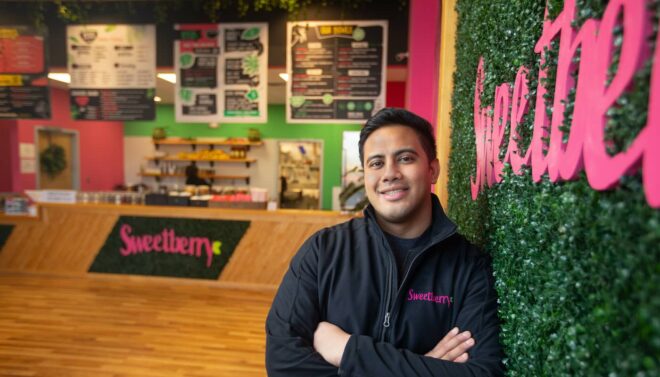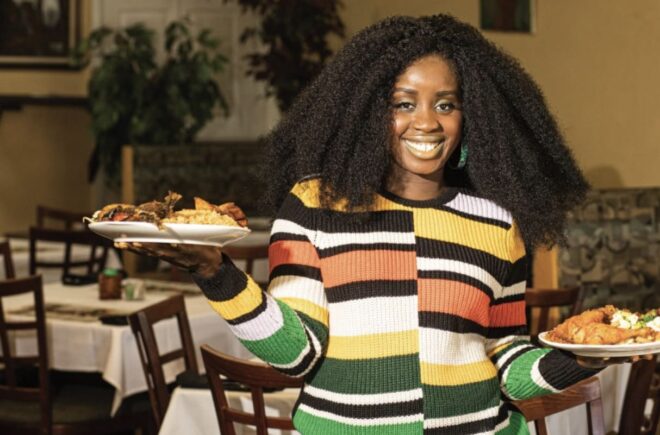Tin Pot Creamery
Editorial Team
15 min read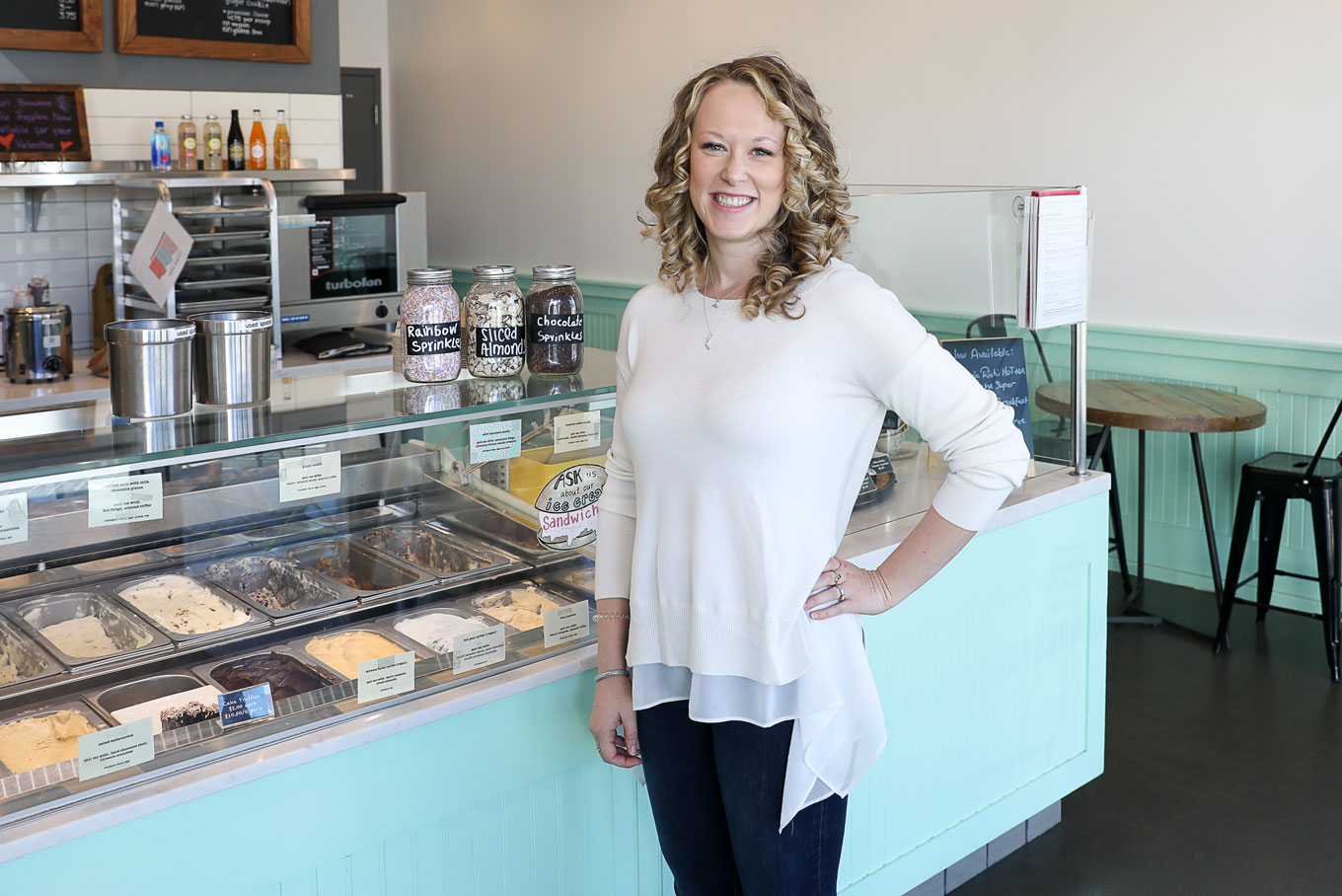
Earlier this year, we launched a new series called Meet the Merchant, Q&As with real-world Clover® merchants. In our first installment, we talked to cultural sensation Ludwig’s German Table. Just a few short months later, a tiny little virus would turn the world upside down, forcing the temporary—and sometimes, sadly, permanent—closures of countless small businesses.
We sit down—virtually of course—with Becky Sunseri, the founder of Tin Pot Creamery. Join us as Becky recounts the story of Tin Pot, from its humble beginnings in her living room to a thriving, multi-location ice cream powerhouse, and pulls back the curtain on the series of steps she and her team took to keep their shops open when the COVID-19 crisis hit. Tin Pot is one of the many small businesses impacted by the coronavirus, but their resilience and determination to stay in business embodies the spirit that’s powering local economies all over the United States right now.
This installment of the Meet the Merchant series is a COVID-19 Small Business special edition.
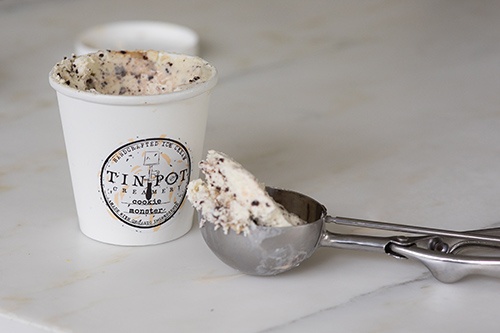
Clover: Where does the name Tin Pot Creamery come from?
Becky Sunseri: The name comes from a really old ice cream recipe. It says to freeze the ice cream in six tin pots… and I like the idea of the tin pot representing something homemade. So we’re going back to the basics of homemade ice cream, with a little spin on it.
Clover: What sparked the idea for Tin Pot Creamery?
Sunseri: It all started when I was a little girl in central Illinois. My mom is a wonderful baker; she would make everything from scratch. She would make home-made bread; instead of cereal we’d have home-made granola. My dad is a composer. Every Sunday morning he’d be in his office (aka bedroom) I wouldn’t be able to interrupt until I stopped hearing music coming out of the room.
So that’s the atmosphere I grew up in. I realized the value of creativity from my Dad, and from my Mom I learned how much better homemade food tastes. I got really interested in the creative side, in flavor pairings. I wanted to create something that combined the joy of food and great ingredients you can feel good about.
After university, I moved out to the Bay Area, and went to pastry school in San Francisco. I worked in bakeries and restaurants and ultimately ended up at the Facebook kitchen. I started there when it was still small; there was only one other pastry person there. I learned so much—how to produce great products at scale, many trials and errors with different foods. If I hadn’t spent time at Facebook, there’s no way I’d be able to open Tin Pot.
Clover: What did Facebook employees think of your ice cream?
Sunseri: It’s ironic because the one thing I never made [at Facebook] was ice cream. I’d bring home the baked goods from work, and put them together with ice cream I made at home, and that’s really how I started to develop the flavors for Tin Pot. I had no idea where to start. I didn’t have any money and I didn’t have a shop location. So I started an ice cream of the month club. [laughs] I sold my first membership to someone at my gym class. And that’s how it started.
Clover: An ice cream of the month club—very innovative! How did you go about growing the business?
Sunseri: I said to myself, this is great but now I have to figure this out! This was in the days before we had all this great navigation on our phones. I would print out all the [customer] addresses, spread them out on my carpet, and move them around to try and figure out how to get to all these places. I would give them a delivery window of three hours on a specific day of the month. Things like that. Long story short, it was a lot of work, but I ended up getting a fair number of customers, from San Francisco to San Jose. I was struck by the fact that people in San Francisco can get great ice cream and they were still buying mine. So I knew I had something extra special.
That was how we were able to get our first location in Palo Alto. The shopping center we’re a part of [now] did a whole beauty contest, if you will, [when they were looking for shops]. When they decided to go with us, they said “We’re taking a leap of faith, but your ice cream is so good, you have a lot of followers who love your product, and we love the idea that you’re from this area.”
So that’s how it all started.
It’s been a really fun journey. We’ve got five scoop shop locations—Palo Alto, Los Altos, Campbell, San Mateo, and our most recent one opened in the Chase Center in San Francisco, where the Warriors play. It was doing really great until all events got cancelled everywhere.

Clover: With your multiple locations, are you doing things differently than you would with a single location?
Sunseri: The more locations you have, the more difficult it is because you have more overhead, things like rent and payroll. We’re lucky because we’re in that sweet spot of not having so many [locations] that it’s unmanageable but having more than one allows us to get more revenue.
We have a kitchen where we make everything and because it’s not far [from our locations] we can distribute our products to our stores on our own—and just once a week if we need to, since ice cream has a longer shelf life than other food products. Some of the stores bake their own cookies so we sell cookies at those locations.
Clover: COVID-19 is on everyone’s minds right now. What was your initial reaction as a small biz owner, in the early stages?
Sunseri: It happened in phases, as I realized the severity of it all. We’re lucky in that we have a small enough team that we can talk often and make fast decisions. There was a meeting where we discussed it, well before any of the shelter-in-place orders. We could see what had happened in other countries, so in that first meeting, we said we should implement extra safety measures and educate our staff. We knew it might come down to store closures but hopefully not… it was still a “just in case” kind of thing. We knew it was possible, but I honestly didn’t think it would come to that. Then we started walking closer and closer to stores being closed, and I started to see it on the horizon.
And as it evolved, day by day, we would communicate to our staff and adjust our business according to [the latest] regulations.
Clover: Walk us through those early steps to weather the crisis.
Sunseri: Before COVID-19, 97% of our revenue came from our stores, and we knew we had to do something else to keep revenue coming in. We had to find a new way to operate. It was obvious from the very beginning that we had to flesh out delivery. We already had one channel set up, DoorDash… so we changed to 100% delivery and pickup. Now we’re on all the delivery platforms: DoorDash, Uber Eats, and Grubhub. We’ve also got store pickup so people can call ahead. But these delivery services have a limited delivery radius for frozen products, so having more locations in the Bay Area is helpful for us because we can reach more people.
We also started leaning more into our social, promoting what we’re doing, letting people know we’re open, posting updates every day as opposed to a few times a week. We had to increase our marketing, because it’s different now.
It reminds me of the very beginning of Tin Pot. Back then I didn’t know anything, about managing people or payroll. I had to learn everything. [Starting a business] is chaotic and it means you don’t sleep that much for a while, but you also learn a lot. So I put on that hat again. This is a new business all over again. We’re selling products we’ve always been selling but through a totally different channel.
Clover: Sadly, many shops are closing their doors. Was that ever a consideration for Tin Pot?
Sunseri: Foot traffic has been the main driver for us. 80% of the purchases are [by] people who walk by and say, “Oh, I want ice cream!” or they’re going to dinner, they spot us, and they say, “Let’s go there afterwards.” So it’s not as much of a planned purchase, and that’s making things really hard right now.
At this point, keeping our doors open is better than not. We looked at the numbers to see how much we’d lose if we closed, and determined if we can make a certain amount, then we can at least keep our doors open. So that’s how we’re operating right now.
The crisis is changing people’s behavior in every way. It’s changing how we can sell, but it’s also changing how people can buy. [Business] is always evolving but now it’s really sped up. There is this intense need to embrace technology and figure out how to sell a product like this, at a time like this.
Clover: Let’s unpack the tech angle.
Sunseri: [laughs] You know, it’s interesting, because I’ve been wanting to redo our website for a long time but don’t have much experience with that type of thing. We had this really old site that’s been around since 2012, and we could sell from it but hadn’t been driving people there. It was never a top priority and we thought it would cost too much [to upgrade]. But then [the crisis] happened and I realized we cannot wait. This is the only way we could grow beyond the delivery model.
So I called up my cousin, who is amazing, and we had it up in 4 days. I learned so much and it was fueled by this mentality of we HAVE to make this work. There’s no way I would have been able to do this without that mentality.
Clover: What platform did you use?
Sunseri: It was either BigCommerce, Shopify, or WooCommerce. We pulled up some old notes comparing [these platforms], and the decision was pretty quick: with BigCommerce, there are no transaction fees if you have multiple payment methods. And it integrates with Clover, which was important if we wanted to ramp up e-commerce on our Clover systems. So BigCommerce it was!
BigCommerce has a plugin for Clover that’s super easy to set up. There were just a couple things I had to do, and all of a sudden the payments showed up on Clover. It’s all tied in, so now all of our system is together, so I can look at all the stores and also the e-com in the same dashboard. That’s huge because it’s really hard to find everything and be able to look at it together. Knowing that e-com is coming through Clover as well, makes it so much simpler.
So now, the new site has been up a little over a week. It’s making it much easier for customers to navigate, and the checkout process is really easy… we shipped out more boxes in the last four days than we had in the past 3 months before the new site! And now we are working on making it as gift-friendly as possible, since the majority of the orders are gifts.
Clover: Some businesses are exploring ways to partner with each other. You mentioned you’re working with a few other merchants?
Sunseri: Yes! We partner with Fleet Street Café in Menlo Park. They’ll start offering Tin Pot on their menu for delivery, since we’ve been working with them to supply them with ice cream. We’re doing promotions for Fleet Street as well on our channels. We’re also reaching out to our suppliers, like Verve Coffee to see if we can do something together, promote each other.
So much is happening so fast, so we’re trying to move as fast as possible.
Clover: The hardest part about a crisis is often not the revenue but taking care of the people.
Sunseri: Yeah. It’s been really hard. The most important thing is keeping people safe. I want to do my part and do everything I can to take care of the people who work for Tin Pot. We’ve been able to maintain our full-time staff: all the store managers, the district manager, our production manager, our finance person, the CEO. I’m very grateful for that. But we don’t have hours for [the other] 80% of our staff. We started a relief fund for them, like a lot of business are doing. We’re trying to help in any way we can and we’re planning on welcoming everybody back with open arms as soon as we can.
Clover: How is the community responding?
Sunseri: I’m finding that people want to help, which is really nice. I definitely feel the support from not just my friends and family but our customers. People want to know if we’re open because a lot of places aren’t. We’re seeing an uptick in our delivery services, that’s been continually going up, so I’m happy to see that.
And people are asking, what can I do how to support Tin Pot, how do I help? That’s been really, really nice.
Honestly, out of all of this, the silver lining is people coming together and wanting to support each other. There’s been this realization, like a curtain pulled back, that… wait a minute, small businesses are people. It’s ironic because we’re all separated in our own homes and we can’t be together. And that’s bringing out this innate need in humans to connect. If we can’t physically connect and see each other face to face, we have to be proactive in figuring out how to do it in other ways—and helping people is one way to connect. I think a lot of people are starting to realize, for example, I can buy a gift card from one of our favorite restaurants.
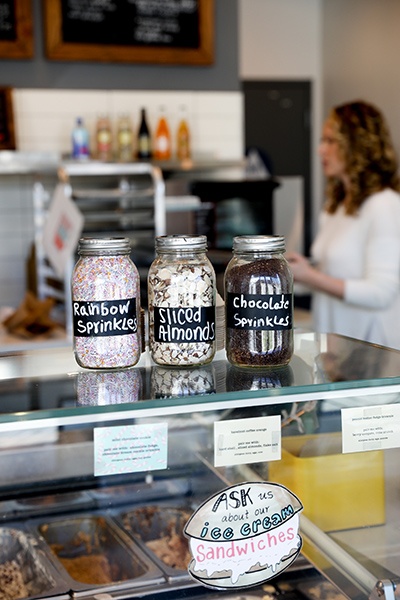
Clover: What advice would you give other small business owners struggling to maintain their operations?
Sunseri: Talk to people and be honest, make sure you have a place to feel supported, it’s easy to feel alone. Try to find people you can talk to who are going through something similar, because it can be really lonely. Also, throw the rule book completely out the window and just do stuff. If something feels right just try it—you can always pivot later. We don’t have time to do the vetting we normally would.
It’s also important to have your products in more places. We’re in a few specialty grocery stores already, and this week we launched in Whole Foods—45 locations in Northern California.
Clover: And how would you compare the challenges of running a business during non-crisis times versus a global health emergency like this one?
Sunseri: Running a business is hard. In a great economy, it’s a lot harder to talk about how scared you are, how you’re trying something you don’t know, or the things that don’t go well. I learned so much from so many mistakes. I felt I couldn’t share that stuff before, but now, when there is thing that’s affecting everybody, now that we’re all struggling, people are openly talking about struggling: I have to let employees go because I don’t have the hours. How do I support them? How am I gonna pay my bills? How am I going to have enough cash reserves? Everyone is sharing information.
Another thing—and I can only speak for myself—is that I don’t look at businesses that are similar to mine as competitors right now. Instead, I think, we’re in this together, we’re like a family. I’m trying to figure out some way to reach out to them and put my arm around them. Because those are the people who know exactly what I’m going through. I don’t look at business any more as a separate thing from people. It has always felt like people are number one, but it’s true now more than ever.
Clover: What has been the most inspiring moment during this crisis so far?
Sunseri: It all comes back to people wanting to help people. It’s the whole cumulative outreach, everybody wants to help each other—and support [our] health care workers. We want to help too, so we’ve been talking internally… one idea we’re considering is dropping off some ice cream to the medical workers at local hospitals.
Clover has a unique opportunity and ability to help people because right now we need help from services that are about helping small businesses, connecting people, simplifying processes that support small business. That’s now more important than ever. And that means a lot, so thank you.
To learn more about our POS systems for ice cream shops, contact a Clover Business Consultant today.
All photography courtesy of Annie Barnett.
“This information is provided for informational purposes only and should not be construed as legal, financial, or tax advice. Readers should contact their attorneys, financial advisors, or tax professionals to obtain advice with respect to any particular matter.”
Related Posts
Sweetberry
Fannie’s West African Cuisine
Popular Topics
Stay In Touch
Sign up and learn more about Clover.
Thank you for your subscription!
Recent Stories
- How to buy a restaurant
- How to evaluate employee performance like an enterprise company
- Dropshipping: What it is & why it might be smart for your small business
Please share your contact information
to access our premium content.
Thank you for sharing your contact information.
Download Now
